
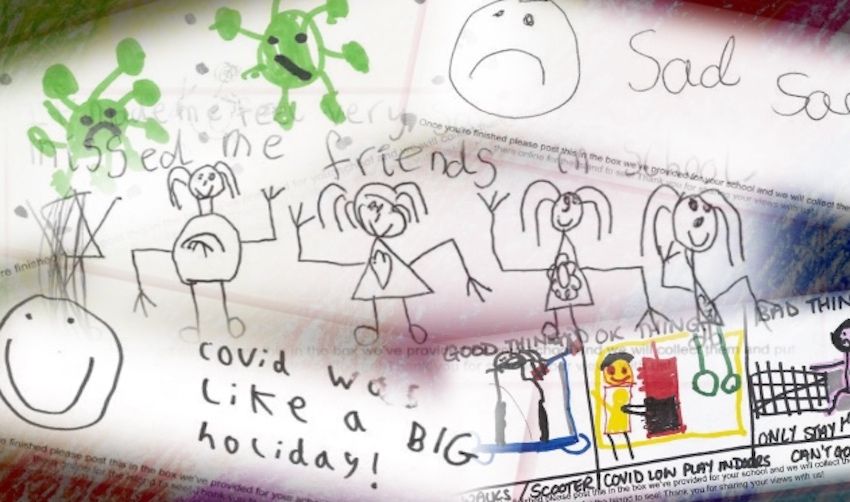

From smiley-faced descriptions of covid as a "holiday" to tears over missing friends and playtime... A new report has provided an intimate glimpse into Jersey children's thoughts and feelings during the pandemic.
Education, mental health and socialisation have been identified as the “biggest challenges” to children and young people during the pandemic, it found.
Published this month by the Children, Education and Home Affairs Scrutiny Panel, the report outlines the key ways that young people have been impacted by the pandemic, including the positive outcomes: getting to spend time with family, saving money (especially amongst older young people), and more free time.
As part of the review, the panel invited a focus group of children aged seven and under to share their experiences of the pandemic in the form of a ‘postcard’.
Children expressed their views in writing, by drawing a picture, or choosing an ‘emoji’ that best described their feelings.
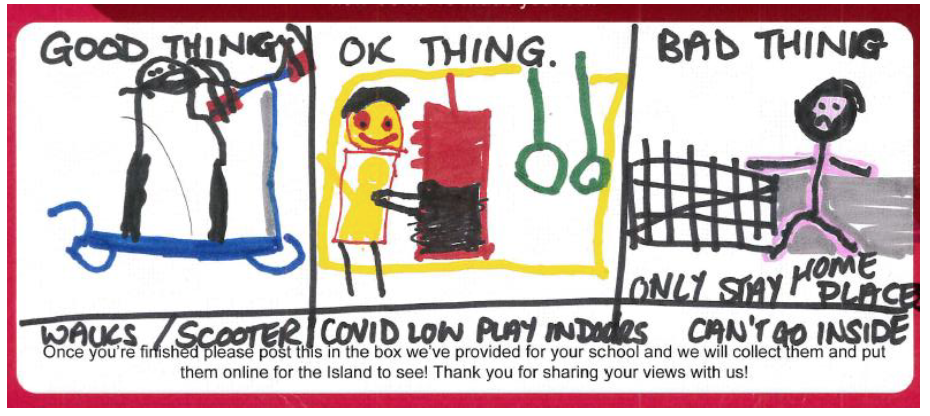
Pictured: Children were invited to share both the good and bad aspects of the pandemic.
The Panel received 132 postcards, with 83% of respondents feeling their experience of the pandemic had been ‘awful’, ‘not very good’, or ‘ok’. The main themes highlighted by children were school closures and not being able to see their friends and family.
A positive theme that emerged was children spending more time with their family as a result of having to stay at home, with one child going as far as to say “Covid was like a BIG holiday!”
Summarising the report, the Panel says two key themes arose from the review: “Firstly, it is clear that children and young people reported a mixture of positive and negative impacts as a result of the pandemic.
“We also found, direct from children and young people, that they did not always feel that they had been put first during the response to the pandemic.”
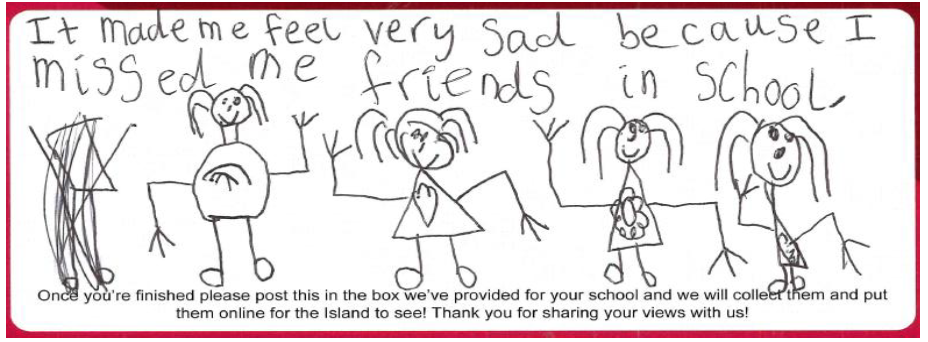
Pictured: A common theme highlighted by the survey was children missing their friends and family.
In the foreword to the report, Deputy Louise Doublet, who led the review, said the pandemic had brought about “unprecedented challenges” to the island that impacted “all sections of our society”.
“Given the Government’s strategic priority of ‘putting children first’ it was important to the Panel that we examine the response to the pandemic and how it has impacted children and young people.”
Express took a closer look at the key issues identified in the report…
Last year, the island's child and adolescent mental health services (CAMHS) dealt with a 20% increase in cases, with the problem thought to be worse in Jersey than the UK.
One of the main concerns raised by children and young people in the recent survey was the impact of the pandemic, lockdowns and general uncertainty on their mental health.
Along with the postcards for younger children, the Panel commissioned a short optional survey for children aged 7–18, which found that many respondents felt their mental health had been negatively affected.
The Panel also worked with advisors from the University of Bath, who raised concerns over the impact of loneliness, isolation and pressures at home.
In 2020 and 2021, the Minister for Children and Education accessed an additional £1.25m from the covid contingency funding to address the increased numbers of referrals and waiting times for mental health services.
By 2022, this extra funding helped reduce the waiting times experienced to pre-pandemic levels.
The Panel recommended that the additional funding received over 2020 and 2021 be maintained in the base budget for the Department for Children, Young People, Education and Skills (CYPES) within the next Government Plan 2023–2026.
One of the largest impacts on children and young people throughout the pandemic has been in relation to their education, although the Panel say the “full and true impact” on children’s learning may not be known for “some time yet”.
The Government introduced new initiatives to mitigate this impact, including a tutoring programme, designed to help children catch up with their learning after falling behind due to school disruptions.
A report from the Government’s School Improvement Advisory Service shows that the £1.24m programme has provided 12,053 hours of tutoring across 27 mainstream schools so far.
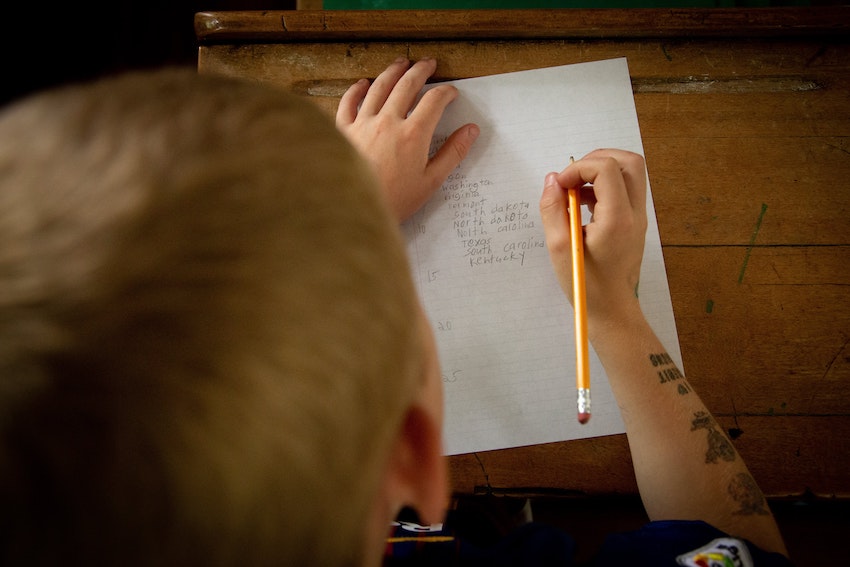
Pictured: 30% of pupils in Government schools have been supported by the programme.
The report highlights there was a significant number of children behind in school, but the programme has helped bridge the gap. A greater number of pupils are now ‘working at’ the standard and ‘working at greater depth’ than at the start of the programme.
More needs to be done, however, and the Panel recommends the impact on children’s learning should be closely monitored as a “matter of priority”.
From the surveys, it was clear that children missed seeing their friends and family as a result of the stay-at-home order.
The Jersey Association of Home Educators felt as though their community had “slipped between the cracks” during the stage of the pandemic when schools were open but socialising outside of school was still restricted.
“It became increasingly challenging for our home educating community or ‘bubble’ to socialise our children together, even outdoors,” they said.
Despite schools being open, restrictions included the closure of youth clubs, drama and singing groups, and other extra-curricular activities. However, a joint survey between the Children’s Commissioner and CYPES that 85% of children said they had something fun to do during the initial lockdown.
The Panel’s own survey found that nearly 40% of respondents wanted additional support with fun activities post-lockdown.
As part of a wider response to the pandemic impact, the Panel recommended that Ministers undertake a review of the leisure and play facilities available to children by the end of 2022 to address any gaps.
According to the Children’s Commissioner, more than one-third of households reported that their finances had deteriorated due to the pandemic in 2020.
Foodbank usage increased during the pandemic, with the Commissioner stating: “On some occasions children are queuing up at the foodbank in their school uniform to take food home to mum or whoever it happens to be at home. So we know that poverty is having an impact on their access to food, but it is also having a massive impact on access to housing.”
The Children, Education and Home Affairs Scrutiny Panel added to this, stating: “For those facing severe material deprivation, a lack of quality housing, poor nutrition, and stress/anxiety at home (all worsened by the pandemic) make them ill-prepared to fully engage with education initiatives like tutoring.”
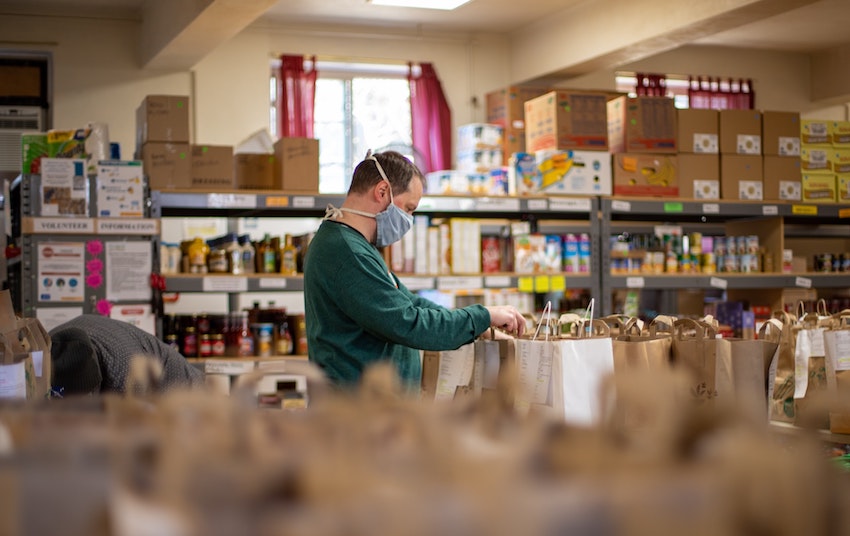
Pictured: More families used food banks during the pandemic.
There is also concern that a “hidden” section of society, aged 16–25-year-olds, could be impacted further, due to not being able to claim the accommodation component of income support in their “own right”.
As a result, the Panel suggests that the Chief Minister, in consultation with the Minister for Social Security, identify any gaps in support for this cohort.
The report states that the needs of children and young people going forward will need to be “kept at the forefront”, adding that the Minister for Children and Education has also committed “extra resources” to assist in the recovery process.
Adding to this, Deputy Louise Doublet said: “We must not lose sight of the impact that the pandemic will have had on those children for whom the majority of their life experience has been stay at home orders, limited social interaction and not being able to spend time with elderly relatives and friends.
“Children are only children for a very short period of time, and it is in these formative years that they are shaped and moulded into the individuals that they will become in adulthood.”
Comments
Comments on this story express the views of the commentator only, not Bailiwick Publishing. We are unable to guarantee the accuracy of any of those comments.